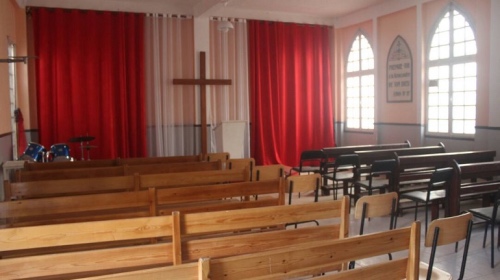Three churches recently closed down by authorities in Algeria’s northern province of Oran were permitted to re-open last Sunday.
The three churches, located in Oran city, Ain Turk (30 kilometres west of Oran), and El Ayaida (35 kilometres east of Oran), were closed between November, 2017, and February, 2018.

Three churches in Ait-Mellikeche, Maatkas and Azagher are still closed. PICTURE: World Watch Monitor.
On Sunday, the three churches were allowed to re-open following a notification issued by the governor of Oran province.
Rachid Seghir, who is the pastor at the main church of Oran city, told World Watch Monitor about the moment he received the notification.
“It was about 1pm when I got a call asking me to get to the police station as soon as possible, without giving further details,” he recalled. “I first informed some church members, before heading to the police station which is about 300 metres away from the church in Oran.”
At the police station, Seghir was handed a notification to sign.
“It was hard to believe, as I was not expecting such a positive surprise!” said Seghir, who could barely hide his emotions. “Honestly, I have not understood anything that happened: I had read the notification and understood it correctly, but I remained amazed. ‘Maybe it’s just a trap,’ I thought.”
The pastor then left the police station and went directly to the church to share the news with some church members, as he continued to reflect on the event.
Recalling how events had unfolded since November last year, the pastor said: “First we were notified that we have to regularise our situation according to the safety regulations, or we will have to close our premises in three months – something which was impossible for us. Then, one month later they came and sealed off the doors of the church. And now they are notifying us that we can reopen and carry out our services in peace.”
Just 45 minutes after he was first called to the police station, three officers in uniform came and removed the seals from the church’s main door, without making any comment.
In their notification, the local authorities also did not provide any reasons justifying their change of stance.
The document only stipulated “the place of worship belonging to the Protestant church located at Abane Ramdane street will be re-opened”, and that state services, including the police, “will work towards the implementation of this decision”.
Later, Seghir received two other notifications regarding the churches in Ain Turk and El Ayaida.
“The procedure was identical to the first one,” he explained. “And it was such a surprise for me, as well as for all our brothers and sisters in Christ. We were asking ourselves the same question: ‘Should we trust them?’”
“We are very pleased to be able to resume our activities without fear of new threats. We hope that all churches can be regularised and able to work in peace and freedom. Such a thing can only be beneficial to the image of the country,” he added.
L’Eglise Protestante d’Algerie, the umbrella organisation linking 45 Protestant churches in Algeria (EPA), has welcomed the decision to reopen the three churches.
In a statement issued on 12th June, the EPA expressed its gratitude to “all those who, in one way or another, through their support, have made this happy event possible”.
However, the EPA decried the initial decision to close the churches, saying: “These three churches have been arbitrarily closed down by the authorities for several months, having prevented their members from worshiping God freely, and this is in clear disregard of the Algerian Constitution and human rights.”
The grouping called on its supporters “to maintain the pressure, until all decisions to close places of worship in Bejaia and Tizi Ouzou are lifted”.
In all, six churches and a day nursery had been closed since November. The most recent closures were on 26th May, when churches in Ait-Mellikeche (Bejaia province) and Maatkas (Tizi Ouzou province) were ordered to close. In March, the village church in Azagher, near the town of Akbou (Bejaia province), was forced to stop all activities. A number of other churches have also received notifications to close down immediately.
The three churches in Ait-Mellikeche, Maatkas and Azagher are still closed.
The government accused them of not complying with safety regulations and of operating without permission. But the EPA denied the accusations, stating that the government is simply implementing the 2006 law of regulating non-Muslim worship, which stipulates that permission must be obtained before using a building for non-Muslim worship, and that such worship can only be conducted in buildings which have been specifically designated for that purpose.
But in practice, the authorities have failed to respond to almost all applications from churches for places of worship, including churches affiliated to the EPA, which was officially recognised by the government from 1974 until 2012, when new laws meant it had to re-register.
Despite meeting all the legal requirements and applying for re-registration in 2013, the EPA is yet to receive an official government response, meaning, technically, it lacks official legal status.





